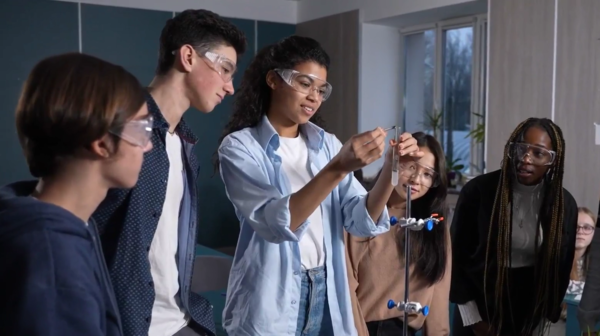Blog
Supporting course choice for improved wellbeing
What with the usual Year 11 stresses at this point in the year, add in pandemic fallout and there is a perfect recipe for worried students. Options can help reduce anxiety and improve their confidence in their choices for the future.

Author: Dr Nigel Newton
Co-Lead researcher with the Education Transitions Across the Lifespan research group at Cardiff Metropolitan University.
Published on April 27, 2022

GCSE exam preparation, anxiety about post-16 choices, plus pandemic fallout means STRESS.
Students navigating their GCSEs while thinking about their post-16 choices already experience considerable anxiety and stress. This has an impact upon both their capacity to study in the present moment and to make positive choices about future pathways. We know that anxiety and stress lead to lower levels of subjective wellbeing and that this further undermines learning motivation and positive learning behaviours. If life in school wasn’t demanding enough in general, we know that the pandemic exacerbated all of these issues. It has particularly affected young people whose home context was also more challenging, including those on low incomes, isolated families and those with parents not equipped to provide additional academic support. For many years, I’ve been working to address the difficulties faced by students making post-16 decisions. I believe there is even greater need for the Options tool now, as it is specifically designed to reduce students’ anxiety and give them confidence in their post-16 choices.
Many working in education had hoped that the full return to school for the majority of students would bring relief to the strains on young people and staff struggling to offer support remotely. While schools have put in place a range of resources and support provision to help young people this academic year, they have also found it very hard to cope with the huge and complex rise in demand from students. Disruption caused by Covid is also continuing to impact learning. All hopes of business as usual have been fully dispensed with.
The full impact of the pandemic on young people’s mental, emotional and physical health is only slowly beginning to be recognised.
The social dimensions of school attendance and engagement with people in a wide range of public contexts cannot be underestimated. In their absence, many young people were forced to retreat within a world limited by technology and the confines of their homes. Schools have always aimed to provide horizon opening opportunities for young people, organising trips, work experience, visiting organisations and events. For the most part, these things ceased or became virtual during the lockdowns and have been slow to restart. We know, for example, that organising work experience has remained a real challenge.
Students facing the difficulties of choosing their A-Levels or other post-16 courses are particularly vulnerable to feeling overwhelmed. The importance of those post-16 choices, the range of pathways on offer, the doubts about future directions and the general state of lowered motivation many young people feel following the pandemic have made decision-making especially tough.
More of the same won’t work. Course information, guidance about careers, taster sessions and open day events all have their place but something different is needed. Engagement with more information when they already feel overwhelmed with catching up lost learning and preparing for exams won’t help wellbeing. Thinking further ahead to careers when young people feel acutely the instability and potential for disruption in the world won’t help with course choices. Taster sessions with new groups of peers and teachers, who may feel like strangers, have the potential to trigger unpredictable reactions. These standard practices of information, advice and guidance support need a new element designed to reduce anxieties and provide learners with genuine confidence in their decision-making.
Our Options tool can help reduce student anxiety about their choices
Options, our research based course decision tool, is designed to help students focus on the essential components of future study, their levels of interest in the specific content of the courses on offer and their aptitudes for the demands of these qualifications. The tool allows young people to reflect on and respond to what would be their lived experience of taking the courses offered in your school; their reactions are scored and presented in ranked order, accompanied by helpful guidance. The data is totally confidential, only the student can see their answers, thus freeing them from the stress of peer pressure and worries about pleasing teachers. Scores can be examined in detail by the student, giving them & their family confidence in their decisions. There are no limitations to how the student uses the tool and we offer guidance to schools on how their processes and support can maximise its benefits.
Students’ wellbeing matters to us immensely. Transition points in education are where underlying tensions and stresses become most acute for students. The key means to address this is by providing open and honest opportunities for reflection on the knowledge content and skills required by courses on offer, in a way that can be responded to and reflected upon. Options does just this and will greatly reduce the anxieties and worries your students have about their post-16 choices, allowing them to focus on their KS4 exams and to succeed.
Dr Nigel Newton
Co-Lead researcher with the Education Transitions Across the Lifespan research group at Cardiff Metropolitan University.
Watch a 1-minute video on the Options tool I developed:
Articles
- Curriculum interests vs ability & career prospects
- The right students on the right post-16 courses for them
- Supporting course choice for improved wellbeing
- Curriculum knowledge and the post-16 admissions process.
- Key steps towards a more successful open evening for your
- Tackling post-16 course drop-out and improving attainment


